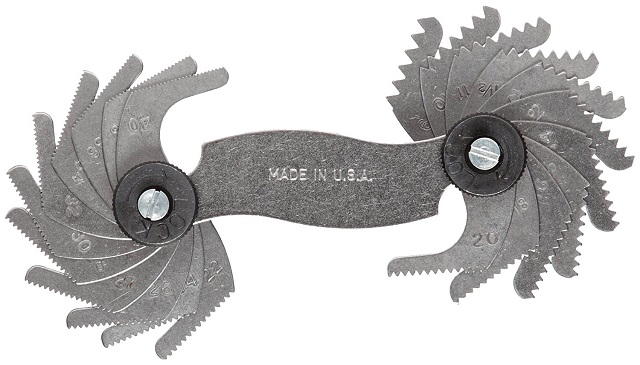| Author | Message | ||
Christian S. Hansen Grand Master Username: enquiring_mind Post Number: 641 Registered: 4-2015 |
1954 Silver Dawn Saloon, STH53, Freestone & Webb Empress Style Coachwork Prior to encountering the problem with the brake drum retaining screws, a less critical but still necessary to "put right" issue regarding the wheel nuts was encountered. As is often the case, a prior owner installed them with EXCESSIVE torque...in excess of 100 ft/lbs rather than simply 50ft/lbs. Had to use a breaker bar to get them off. As a result, the bronze nuts have been crushed onto the diameter of the studs and will need to be re-tapped before reinstalling in order to restore the proper interference between stud and nut and get proper torque. What is the proper threading? The right (off) side is right threaded and the left (near) side is left threaded, so clearly I need right and left threaded taps, but what size? Scoured the service data, but found nothing. Something standard I hope? . | ||
Kelly Opfar Prolific User Username: kelly_opfar Post Number: 192 Registered: 7-2004 |
Christian, the diameter of the studs can be measured with a micrometer or caliper. The pitch can be measured with a pitch gage.  Any cheapo tap set in the hardware store will have a pitch gage in it. My assumption is that your studs are 1/2"-20. I don't have any experience with Dawns, but it's possible that the studs have Whitworth threads. If the pitch gage says they have 12 threads per inch, they are Whitworth. If the nuts were tightened enough to deform the threads, retapping them will allow them to go on, but I suspect they will be loose and ought to be replaced. Flying Spares has new and used ones available. Kelly | ||
Christian S. Hansen Grand Master Username: enquiring_mind Post Number: 643 Registered: 4-2015 |
Kelly... Thanks. I will check that out. Will first find a 1/2 fine thread nut and see if it fits, in lieu of acquiring a thread gauge. Yes, by EPW era RR/B seems to have gone from Whitworth and BS to standard inch threads I think. Will check. The problem is not that the THREADS were damaged by the over torque, but rather the TAPER at the end of the bronze (softer than steel) nut gets "pinched down" as it gets forced into the corresponding steel (stronger than bronze) taper on the rim by the excessive torque. The re-tapping is not so much to clean up the threads, but to widen out the area at the end of the nut where the taper has been pinched down in its inside diameter. Bill Coburn's Tee One Topics has a page where the issue is discussed but I am not organized enough to cite it here. He was in essence saying to NEVER allow the inexperienced or unsupervised tire facility to tighten your lug nuts or to use an air tool to do so as they will inevitably apply too much torque and cause this very damage. . | ||
christopher carnley Unregistered guest Posted From: 109.145.118.0 |
1/2" BSF. Use High Speed taps and loads of cutting paste. Start with the second and then the plug/bottom. "R-R" remove to the rear. Drivers (english) rightside, are RH thread, other left, near side (E)are left hand thread. The phosphor bronze is very tenacious as are all copper alloys, and will break plain carbon steel taps. If not confident, employ a good fitter. (Message approved by david_gore) | ||
Carl Heydon Prolific User Username: car Post Number: 150 Registered: 2-2004 |
Many Mk VI wheel nuts are damaged this way. I have had excellent success using a small socket with a taper and flaring the end of the nut again with a couple of sharp blows. Doesn't take much to give the clearance required | ||
Norman Geeson Unregistered guest Posted From: 81.110.34.153 |
Christian You will notice that these wheel nuts deliberately do not have a thread at the leading end. They are designed as a locking collet to bite the stud if overloading occurs and to exert equal force and contact on each road wheel stud hole. A design that lasted for some years and even served the 10 stud Phantom IV wheels. Do not try to thread the ends but follow Carls advice and spread the leading end outwards to relieve contact with the stud thread. (Message approved by david_gore) | ||
Christian S. Hansen Grand Master Username: enquiring_mind Post Number: 670 Registered: 4-2015 |
Norman... Thank you. Good to hear from you again. I will do as directed. Christian p.s. What's your take on the PII engine clatter issue discussed in the PII section? . |